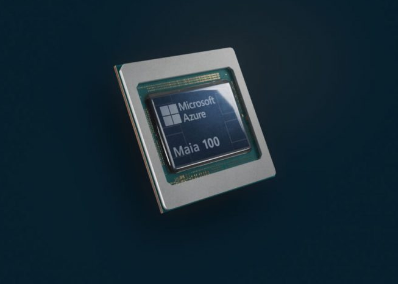Microsoft First In-House AI Chip “Maia” Produced by TSMC’s 5nm
On the 15th, Microsoft introducing its first in-house AI chip, “Maia.” This move signifies the entry of the world’s second-largest cloud service provider (CSP) into the domain of self-developed AI chips. Concurrently, Microsoft introduced the cloud computing processor “Cobalt,” set to be deployed alongside Maia in selected Microsoft data centers early next year. Both cutting-edge chips are produced using TSMC’s advanced 5nm process, as reported by UDN News.

Amidst the global AI fervor, the trend of CSPs developing their own AI chips has gained momentum. Key players like Amazon, Google, and Meta have already ventured into this territory. Microsoft, positioned as the second-largest CSP globally, joined the league on the 15th, unveiling its inaugural self-developed AI chip, Maia, at the annual Ignite developer conference.
These AI chips developed by CSPs are not intended for external sale; rather, they are exclusively reserved for in-house use. However, given the commanding presence of the top four CSPs in the global market, a significant business opportunity unfolds. Market analysts anticipate that, with the exception of Google—aligned with Samsung for chip production—other major CSPs will likely turn to TSMC for the production of their AI self-developed chips.
TSMC maintains its consistent policy of not commenting on specific customer products and order details.
TSMC’s recent earnings call disclosed that 5nm process shipments constituted 37% of Q3 shipments this year, making the most substantial contribution. Having first 5nm plant mass production in 2020, TSMC has introduced various technologies such as N4, N4P, N4X, and N5A in recent years, continually reinforcing its 5nm family capabilities.
Maia is tailored for processing extensive language models. According to Microsoft, it initially serves the company’s services such as $30 per month AI assistant, “Copilot,” which offers Azure cloud customers a customizable alternative to Nvidia chips.
Borkar, Corporate VP, Azure Hardware Systems & Infrastructure at Microsoft, revealed that Microsoft has been testing the Maia chip in Bing search engine and Office AI products. Notably, Microsoft has been relying on Nvidia chips for training GPT models in collaboration with OpenAI, and Maia is currently undergoing testing.
Gulia, Executive VP of Microsoft Cloud and AI Group, emphasized that starting next year, Microsoft customers using Bing, Microsoft 365, and Azure OpenAI services will witness the performance capabilities of Maia.
While actively advancing its in-house AI chip development, Microsoft underscores its commitment to offering cloud services to Azure customers utilizing the latest flagship chips from Nvidia and AMD, sustaining existing collaborations.
Regarding the cloud computing processor Cobalt, adopting the Arm architecture with 128 core chip, it boasts capabilities comparable to Intel and AMD. Developed with chip designs from devices like smartphones for enhanced energy efficiency, Cobalt aims to challenge major cloud competitors, including Amazon.
在线留言询价

Microsoft, MediaTek Team on IoT SoC

Microsoft to make $5bn investment into IoT
- 一周热料
- 紧缺物料秒杀
| 型号 | 品牌 | 询价 |
|---|---|---|
| MC33074DR2G | onsemi | |
| RB751G-40T2R | ROHM Semiconductor | |
| BD71847AMWV-E2 | ROHM Semiconductor | |
| TL431ACLPR | Texas Instruments | |
| CDZVT2R20B | ROHM Semiconductor |
| 型号 | 品牌 | 抢购 |
|---|---|---|
| IPZ40N04S5L4R8ATMA1 | Infineon Technologies | |
| ESR03EZPJ151 | ROHM Semiconductor | |
| TPS63050YFFR | Texas Instruments | |
| STM32F429IGT6 | STMicroelectronics | |
| BP3621 | ROHM Semiconductor | |
| BU33JA2MNVX-CTL | ROHM Semiconductor |
- 周排行榜
- 月排行榜
AMEYA360公众号二维码
识别二维码,即可关注


请输入下方图片中的验证码:























